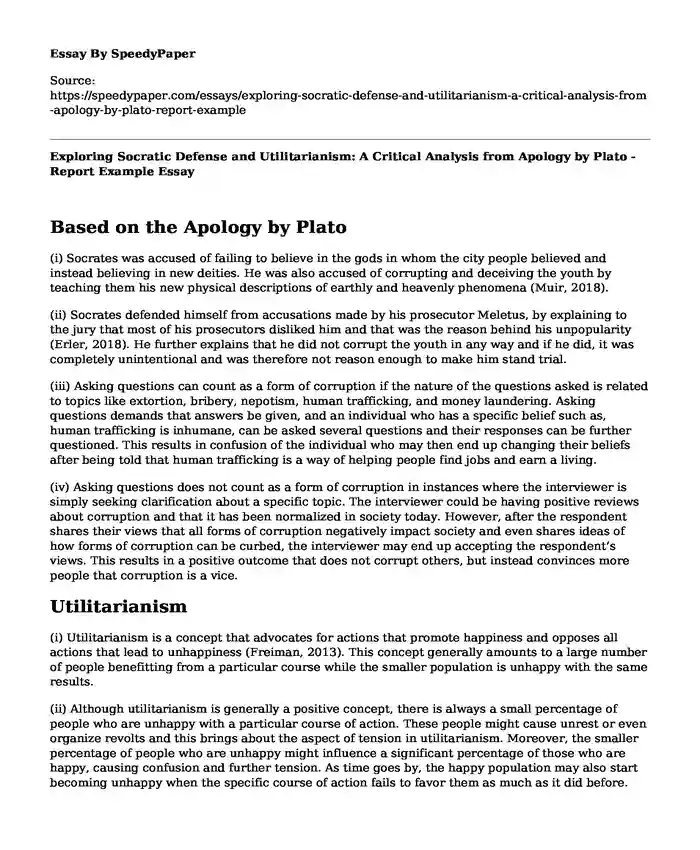
| Essay type: | Analytical essays |
| Categories: | Philosophy Plato |
| Pages: | 3 |
| Wordcount: | 578 words |
Based on the Apology by Plato
(i) Socrates was accused of failing to believe in the gods in whom the city people believed and instead believing in new deities. He was also accused of corrupting and deceiving the youth by teaching them his new physical descriptions of earthly and heavenly phenomena (Muir, 2018).
(ii) Socrates defended himself from accusations made by his prosecutor Meletus, by explaining to the jury that most of his prosecutors disliked him and that was the reason behind his unpopularity (Erler, 2018). He further explains that he did not corrupt the youth in any way and if he did, it was completely unintentional and was therefore not reason enough to make him stand trial.
(iii) Asking questions can count as a form of corruption if the nature of the questions asked is related to topics like extortion, bribery, nepotism, human trafficking, and money laundering. Asking questions demands that answers be given, and an individual who has a specific belief such as, human trafficking is inhumane, can be asked several questions and their responses can be further questioned. This results in confusion of the individual who may then end up changing their beliefs after being told that human trafficking is a way of helping people find jobs and earn a living.
(iv) Asking questions does not count as a form of corruption in instances where the interviewer is simply seeking clarification about a specific topic. The interviewer could be having positive reviews about corruption and that it has been normalized in society today. However, after the respondent shares their views that all forms of corruption negatively impact society and even shares ideas of how forms of corruption can be curbed, the interviewer may end up accepting the respondent’s views. This results in a positive outcome that does not corrupt others, but instead convinces more people that corruption is a vice.
Utilitarianism
(i) Utilitarianism is a concept that advocates for actions that promote happiness and opposes all actions that lead to unhappiness (Freiman, 2013). This concept generally amounts to a large number of people benefitting from a particular course while the smaller population is unhappy with the same results.
(ii) Although utilitarianism is generally a positive concept, there is always a small percentage of people who are unhappy with a particular course of action. These people might cause unrest or even organize revolts and this brings about the aspect of tension in utilitarianism. Moreover, the smaller percentage of people who are unhappy might influence a significant percentage of those who are happy, causing confusion and further tension. As time goes by, the happy population may also start becoming unhappy when the specific course of action fails to favor them as much as it did before. Eventually, when more people join the opposing unhappy side of a specific course, it stops being utilitarianism altogether.
(iii) Utilitarianism is a good concept since it promotes peace among the people. This is achieved because the majority of the population is content. Utilitarianism also enhances adaptation and adjustment skills among the people, since the small percentage of people who are unhappy with a particular choice, will be motivated and encouraged to change their perspectives.
References
Erler, M. (2018). ‘‘Plato Socraticus’ – The Apology of Socrates and Euthyphro. Peitho. Examina Antiqua, (1(2), 79-92. doi: 10.14746/pea.2011.1.5
Freiman, C. (2013). Utilitarianism and Public Justification. Journal Of Social Philosophy, 44(3), 250-269. doi: 10.1111/josp.12033
Muir, S. (2018). Greek Piety and the Charge against Socrates. Mouseion, 15(3), 387-403. doi: 10.3138/mous.15.3-05
Cite this page
Exploring Socratic Defense and Utilitarianism: A Critical Analysis from Apology by Plato - Report Example. (2024, Jan 08). Retrieved from https://speedypaper.com/essays/exploring-socratic-defense-and-utilitarianism-a-critical-analysis-from-apology-by-plato-report-example
Request Removal
If you are the original author of this essay and no longer wish to have it published on the SpeedyPaper website, please click below to request its removal:
- Free Essay on the Studies by Julia Kristeva on the Subject of the Abject
- Essay Sample on Heidegger's Philosophy
- Free Essay: Philosophical Theories Analysis
- Free Essay on Analysis of the Second Treatise of Government by John Locke
- Free Essay - Early Philosophy Through Aristotle, Greek, and Roman Philosophers
- Symposium by Plato - Paper Sample
- Paper on Philosophical Insights: Plato on Immortality, Epicurus on Death, and Taylor's Take on Life's Meaning
Popular categories




